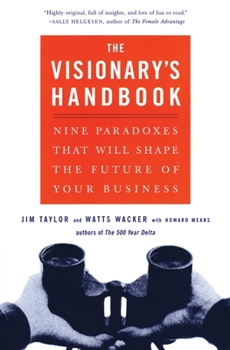Visionary's Handbook: Nine Paradoxes That Will Shape the Future of Your Business
Select Format
Select Condition 
Book Overview
In The 500 Year Delta , Watts Wacker and Jim Taylor astounded readers with their sweeping vision of time and change. Now they proclaim the Age of the Individual - a world where life has never been more difficult, because it has never been easier. Today, individuals have far more power to claim their own futures than ever before, which means they have to follow four major rules to chart their courses: know who you are: know where you want to go; recognise your own seminal moments; and adopt an attitude of insurgency. As these rules are applied to organisations, they too can master the nine paradoxes that abound in everyday life and watch productivity go through the roof.
Format:Paperback
Language:English
ISBN:0066619882
ISBN13:9780066619880
Release Date:July 2001
Publisher:Harper Paperbacks
Length:272 Pages
Weight:1.80 lbs.
Dimensions:0.6" x 5.3" x 8.0"
Customer Reviews
2 ratings
A nice way to keep yourself attuned to private equity issues.
Published by Thriftbooks.com User , 18 years ago
Futurists are a necessity to connect with people who think outside the box of conventional wisdom. Inconvenient to read (those damn tasks), but fun and insightful. This handbook provides a tool to get outside the box.
When was the Future?
Published by Thriftbooks.com User , 24 years ago
It was great to get another fix of Watts - Matter on Fact is good but does not really allow a theme to really develop. I though the book will be great. The discussion on Brand is tremendous - the best I have ever read. This should be required reading for anyone entering business let alone those who seek to specialise in Brand Marketing like I did once, a long time ago. The theme of Paradox is also well handled throughout. Will be great? Greatness is a property acquired over time...I need to muse on the stuff for a little while longer...To pick holes seems a little churlish, but these are the observations I have:· The overall concentration on business and the use of money to value things was not where I thought the book would be. Whilst the authors did a brilliant job of dismantling the present business model for Harvard, maybe the value of a Harvard Education is priceless? What could be applied to the failing inner city schools who can't seem to get kids to read or write let alone count money? · Were they able to charge anything out to Kodak? (After all they benefited considerably from the wisdom therein).· Jon Krakauer's 'Into Thin Air' is a good book, Anatoly Boukreev's 'The Climb' (same subject, professional guide's point of view) is better. I've been long fascinated by the indomitable nature of the human spirit - other suggestions are 'Touching the Void' by Joe Simpson and 'South' by Sir Ernest Shackleton.· I found the main thrust a little bit US centric - I know there were bits and pieces from the rest of the world - but they did feel like bits and pieces. · I also found the future exercises and exams a little distracting.I'd also be fascinated to know how to write a book in a threesome, and what is fascinating the authors now? (where does a futurist who's done Paradox go next?) For me I'm thinking on applying complexity thinking to business (I thought that Howard Sherman's book was a bit disappointing - Stu Kauffmann / Chris Langton are still the standard bearers); and, what after money? I still see the pursuit of wealth as the biggest human preoccupation - shame on us. Is this general, or national/ regional? Zen Bhuddists and Taoists seem to get it. All the .com millionaires and VCs jetting off to Tibet definitely don't get it.Thanks for a great book





